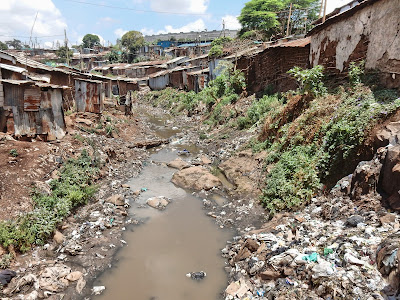I
don’t know if I am going to be able to find any words for today’s blog. Anyone
who has lived in a big city in America thinks they know what a slum is. They think
it is that rundown neighborhood where thugs and drug dealers hang out. Or where
the government built subsidized housing, where the poorest of the poor would live,
but those apartments only attracted rats and other lowlife. Or the working
class section of town became the lower class section when industry in the city
went belly up.
But
travel to a third world country. Find out what a slum is there.
Welcome
to Kibera Slum, the largest slum in Africa and one of the largest in the World.
Home to anywhere between one quarter of a million to a full one million people,
depending on who you talk to and what time of year it is.
There
are no real buildings. Homes and businesses are constructed of handmade bricks
and corrugated tin and sheets of warped plywood and the sacks which 50 pounds
of flour or cornmeal had come in or plastic shopping bags.
Welcome
to a world where there is no sanitation system, no garbage removal.
There
are electric wires running into the slum, and resourceful people will splice
into these wires for free electricity into their homes. Sometimes these wires
are live, sometimes they aren’t. On any given day there won’t be any electricity
going into the slum.
There
are two water lines going into the slum. Two! For a quarter of a million people,
or four times that many. Two water lines.
There
are schools in the slum. Some even claim they are free to attend, but the
children still need to wear uniforms, which their parents cannot afford, and
supply their own supplies, which their parents cannot afford.
The
few medical facilities in the slum are run by charitable organizations,
organizations with limited funds and even more limited staff. The number of HIV
residents is extremely high. ARV drugs are available but many people don’t get
them.
You
can imagine the crime, the drugs, the unwanted pregnancies.
Somehow,
the residents rise above all of this. One group of men run a business making
jewelry from bone.
The
name Kibera comes from the Nubian
word for forest or jungle.
Seems appropriate.
Seems appropriate.








1 comment:
As we "toured" with our 2 local Kenyan men, 1 from our volunteer house & 1 from the Kibera slum we felt safe, they showed us the harsh reality of how people have to live. They are doing the best they know. It is impossible to forget.
Post a Comment